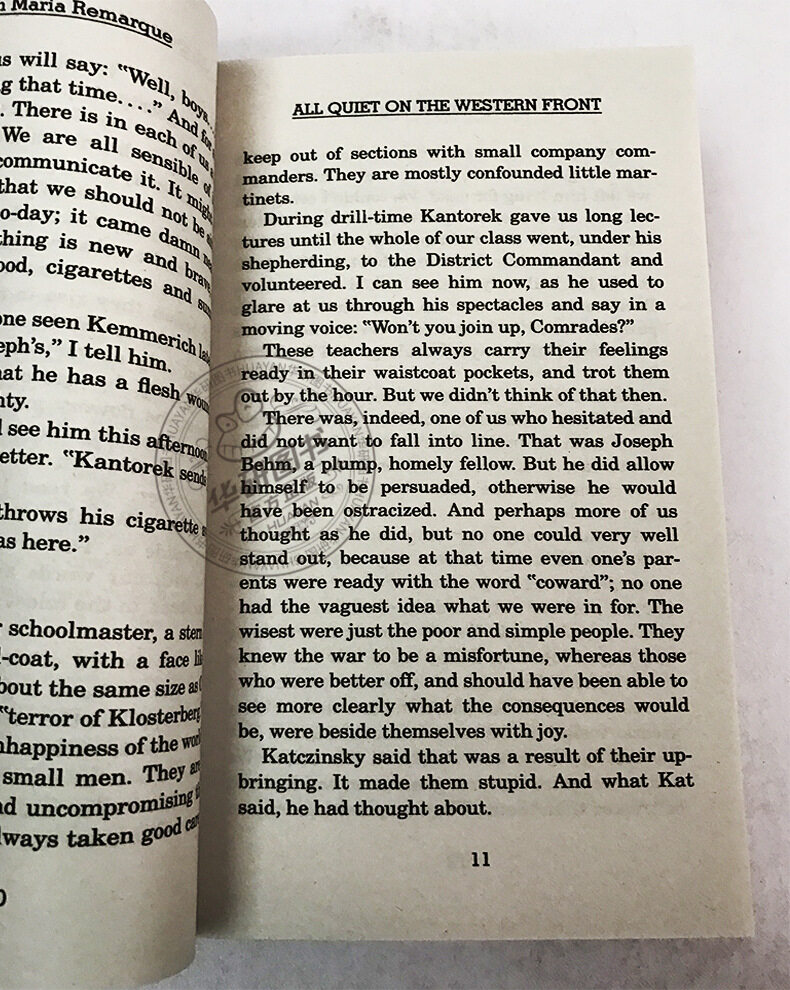


title:All Quiet on the Western Front No war on the west line
Difficulty:LexileLance reading index830L
Author:Erich Maria RemarqueErich Maria Remarque
Name of publishing house:Ballantine Books
Published:1987
Language: English
ISBN:9780449213940
Product size:10.7 x 2 x 17.5 cm
Package: simple package
Number of pages:304
All Quiet on the Western Front"There is no war on the western front"It is the representative work of the German writer Erich Maria remark. It is about that during the first World War, the protagonist Paul and his three classmates were deceived and propagandized by "defending the motherland and the people" and went to the battlefield. In the war, they witnessed the cruelty and devastation of the war, watched one comrade in arms die one after another, their heroic fantasy went bankrupt, their hearts changed, and began to doubt, hate and even hate the war.
This novel is the indictment of the young generation of Germany who were destroyed during the first World War. The success of the work lies in that it uncovers the veil of the so-called sacred and beautiful war with extraordinary truth and ruthlessness, and shows a very clear anti war theme.
Remark was nominated for the Nobel Peace Prize for "no war on the Western Front"; The film of the same name "no war on the Western Front", adapted from the novel, won two Oscars at the 3rd Academy Awards.
Reasons for recommendation:
1. The original novel of the Oscar film no war on the Western Front;
2. The representative works of remaker, an outstanding novelist in the 20th century
3. Recommended by Lin Yutang and Bajin, the masters respected by Zweig and guntgrass.
Excellent book review:
"Without persuasion, you will be conquered by his works; without exaggeration, he can shock your heart."——stefan zweig
"What Remarque shows us is not a hero, but the same Qiu Ba as you and me. Terror, terror, self-defense and murder are always in a state of terror and insanity, and murder is self-defense, and self-defense has to kill. This is the truth of war and the essence of heroes."—— Lin Yutang
"Remark is a great writer. There is no doubt that he has a first-class writing style and can control language freely. Whether writing people or things, his strokes are sharp, steady and firm."—— New York Times
"The power of remakers depiction of the cruelty of modern war will not be weakened in any era."—— The times
Paul Baumer enlisted with his classmates in the German army of World War I. Youthful, enthusiastic, they become soldiers. But despite what they have learned, they break into pieces under the first bombardment in the trenches. And as horrible war plods on year after year, Paul holds fast to a single vow: to fight against the principles of hate that meaninglessly pits young men of the same generation but different uniforms against each other—if only he can come out of the war alive.
Review
“The world has a great writer in Erich Maria Remarque. He is a craftsman of unquestionably first trank, a man who can bend language to his will. Whether he writes of men or of inanimate nature, his touch is sensitive, firm, and sure.” —The New York Times Book Review
During the first World War, nineteen year old Paul boymer was inspired by "patriotism" and volunteered to join the army with his classmates, but the cruelty of war and military life was completely beyond imagination. In the boot camp, they were forced to abandon their previous belief in knowledge and freedom and accept a thorough transformation. After a short training, the recruits were sent to the front line, and everything they saw and heard was cruel: the trenches were full of rats and lice; Severe infectious diseases threaten the lives of every soldier; Comrades in arms were killed or injured one by one and sent to the field hospital; Field hospitals have poor equipment and lack of drugs, resulting in a very high mortality rate.
When Paul returned home from vacation, he found that Germany was still immersed in the heroic fantasy of war. Ordinary people could not imagine the disaster suffered by soldiers on the front line. He was completely divorced from his previous life, and his feelings were incomprehensible. Paul returned to the front line. At this time, the war became more and more fierce, and the future was confused
Erich Maria remack(Erich Maria Remarque, 1898 ~ 1970), German American novelist. Born in a working family in Germany, he volunteered to participate in the first World War at the age of 18 and was injured in the front line. After the war, he worked as a teacher, journalist, editor and other jobs. In 1929, the novel "no war on the Western Front" was published, which caused a sensation and was quickly translated into more than 20 languages, making him a world-famous writer. Because of his anti war stance, after the Nazis came to power, they publicly burned his works and those of Thomas Mann. In 1938, he was deprived of German nationality and then exiled in the United States. In 1947, he became an American citizen, and the following year he returned and settled in Switzerland. On September 25th, 1970, remark died in Switzerland. In 1991, the Erich Maria remark peace prize was established in his hometown of osnabluc.
Most of raymarks works are autobiographical, with concise words, but the lyrical writing shows an objective and cold temperament, which is compared to Hemingway of Germany. In his life, he wrote 15 novels, three plays and two anthologies, among which many works such as no war on the western front, Arc de Triomphe, three partners and the age of love and death were adapted into films.
Erich Maria Remarque, who was born in Germany, was drafted into the German army during World War I. Through the hazardous years following the war he worked at many occupations: schoolteacher, small-town drama critic, race-car driver, editor of a sports magazine. His first novel,All Quiet on the Western Front, was published in Germany in 1928. A brilliant success, selling more than a million copies, it was the first of many literary triumphs. When the Nazis came to power, Remarque left Germany for Switzerland. He rejected all attempts to persuade him to return, and as a result he lost his German citizenship, his books were burned, and his films banned. He went to the United States in 1938 and became a citizen in 1947. He later lived in Switzerland with his second wife, the actress Paulette Goddard. He died in September 1970.
We are at rest five miles behind the front. Yesterday we were relieved, and now our bellies are full of beef and haricot beans. We are satisfied and at peace. Each man has another mess-tin full for the evening; and, what is more, there is a double ration of sausage and bread. That puts a man in fine trim. We have not had such luck as this for a long time. The cook with his carroty head is begging us to eat; he beckons with his ladle to every one that passes, and spoons him out a great dollop. He does not see how he can empty his stew-pot in time for coffee. Tjaden and Müller have produced two washbasins and had them filled up to the brim as a reserve. In Tjaden this is voracity, in Müller it is foresight. Where Tjaden puts it all is a mystery, for he is and always will be as thin as a rake. What’s more important still is the issue of a double ration of smokes. Ten cigars, twenty cigarettes, and two quids of chew per man; now that is decent. I have exchanged my chewing tobacco with Katczinsky for his cigarettes, which means I have forty altogether. That’s enough for a day.
It is true we have no right to this windfall. The Prussian is not so generous. We have only a miscalculation to thank for it.
Fourteen days ago we had to go up and relieve the front line. It was fairly quiet on our sector, so the quartermaster who remained in the rear had requisitioned the usual quantity of rations and provided for the full company of one hundred and fifty men. But on the last day an astonishing number of English heavies opened up on us with high-explosive, drumming ceaselessly on our position, so that we suffered severely and came back only eighty strong.
Last night we moved back and settled down to get a good sleep for once: Katczinsky is right when he says it would not be such a bad war if only one could get a little more sleep. In the line we have had next to none, and fourteen days is a long time at one stretch.
It was noon before the first of us crawled out of our quarters. Half an hour later every man had his mess-tin and we gathered at the cookhouse, which smelt greasy and nourishing. At the head of the queue of course were the hungriest—little Albert Kropp, the clearest thinker among us and therefore only a lance-corporal; Müller, who still carries his school textbooks with him, dreams of examinations, and during a bombardment mutters propositions in physics; Leer, who wears a full beard and has a preference for the girls from officers’ brothels. He swears that they are obliged by an army order to wear silk chemises and to bathe before entertaining guests of the rank of captain and upwards. And as the fourth, myself, Paul Bäumer. And four are nineteen years of age, and all four joined up from the same class as volunteers for the war.
Close behind us were our friends: Tjaden, a skinny locksmith of our own age, the biggest eater of the company. He sits down to eat as thin as a grasshopper and gets up as big as a bug in the family way; Haie Westhus, of the same age, a peat-digger, who can easily hold a ration-loaf in his hand and say: Guess what I’ve got in my fist; then Detering, a peasant, who thinks of nothing but his farm-yard and his wife; and finally Stanislaus Katczinsky, the leader of our group, shrewd, cunning, and hard-bitten, forty years of age, with a face of the soil, blue eyes, bent shoulders, and a remarkable nose for dirty weather, good food, and soft jobs.
Our gang formed the head of the queue before the cook-house. We were growing impatient, for the cook paid no attention to us.